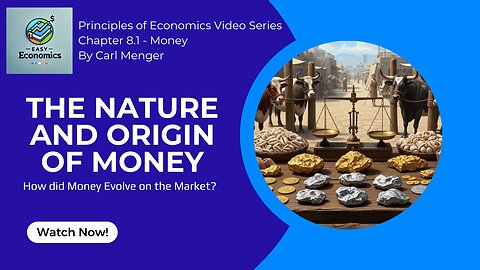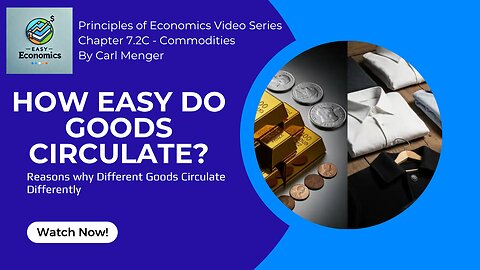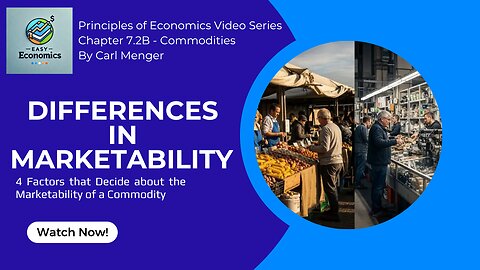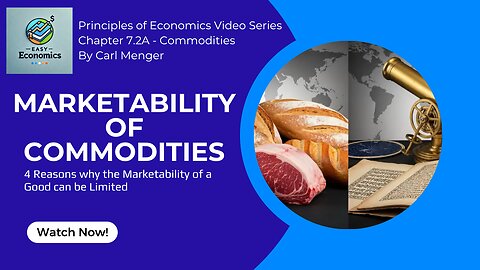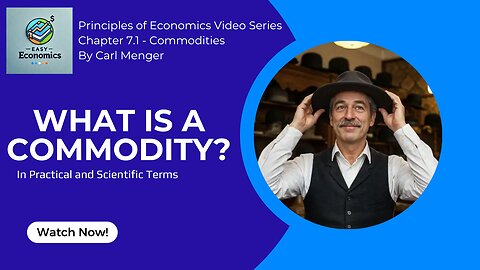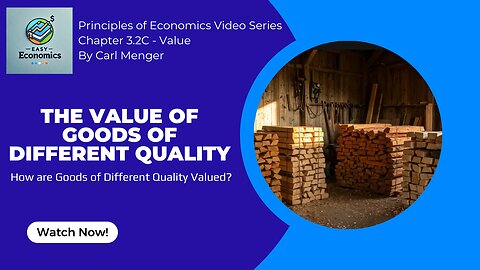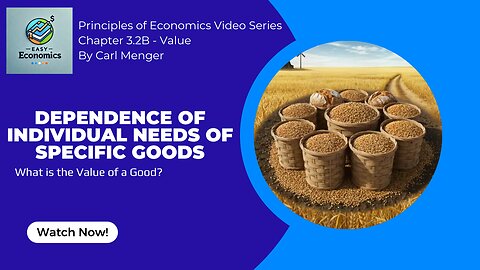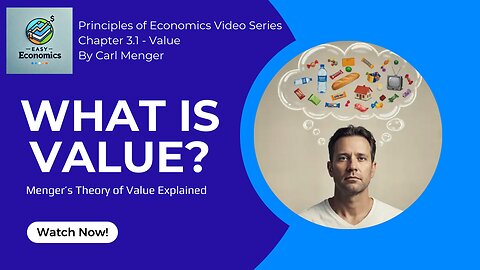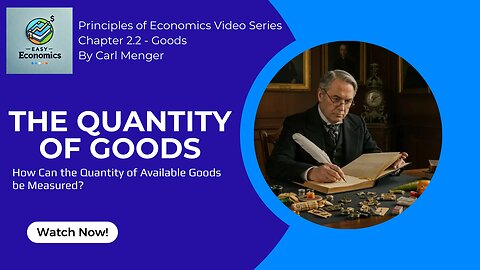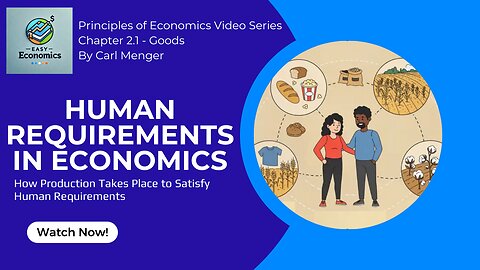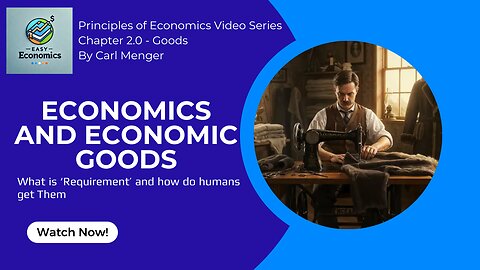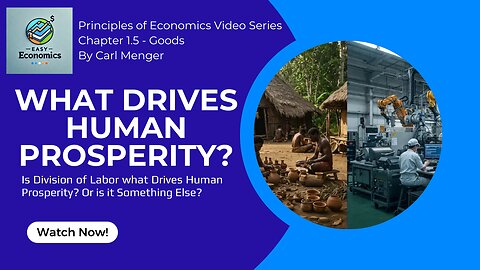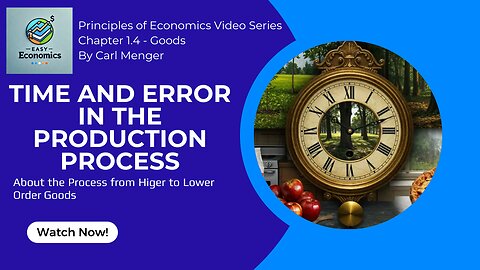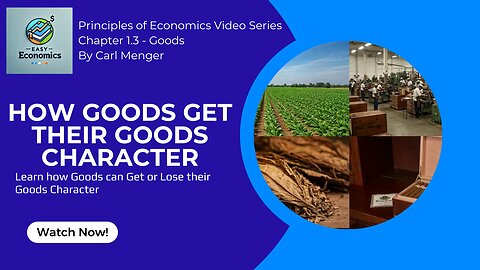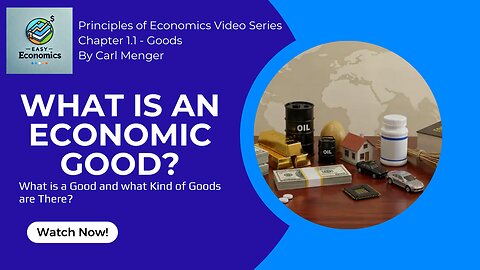Premium Only Content

Principles of Economics by Carl Menger Chapter 8.1 - The Nature and Origin of Money
Principles of Economics by Carl Menger Chapter 7.2C - Circulability of Commodities
Principles of Economics by Carl Menger Chapter 7.2B - Differences in Marketability of Commodities
Principles of Economics by Carl Menger Chapter 7.2A - Marketability of Commodities
Principles of Economics by Carl Menger Chapter 7.1 - What is a Commodity?
Principles of Economics by Carl Menger Chapter 5.3C - Competition Policy
Principles of Economics by Carl Menger Chapter 5.3B - Price Formation by Competing Sellers
Principles of Economics by Carl Menger Chapter 5.3A - Price Forming and Distribution by Competition
Principles of Economics by Carl Menger Chapter 5.2D - Principles of Monopoly Trade
Principles of Economics by Carl Menger Chapter 5.2C - Market Dynamics of Monopoly Pricing
Principles of Economics by Carl Menger Chapter 5.2B - Price Forming in Monopoly Trade for Quantities
Principles of Economics by Carl Menger Chapter 5.2A - Price Formation in Monopoly Trade
Principles of Economics by Carl Menger Chapter 5.1 - Price Formation in Isolated Exchange
Principles of Economics by Carl Menger Chapter 5.0 - The Theory of Price
Principles of Economics by Carl Menger Chapter 4.2 - The Limits of Economic Exchange
Principles of Economics by Carl Menger Chapter 4.1 - Foundations of Economic Exchange
Principles of Economics by Carl Menger Chapter 3.3E - The Value of Land, Labour and Capital
Principles of Economics by Carl Menger Chapter 3.3D - The Value of Individual Higher Order Goods
Principles of Economics by Carl Menger Chapter 3.3C - Combined Value of Higher Order Goods
Principles of Economics by Carl Menger Chapter 3.3B - The Productivity of Capital
Principles of Economics by Carl Menger Chapter 3.3A - What Causes the Value of Higher Order Goods?
Principles of Economics by Carl Menger Chapter 3.2D - The Subjective Nature of the Measure of Value
Principles of Economics by Carl Menger Chapter 3.2C - Influence of the Quality of Goods on Value
Principles of Economics by Carl Menger Chapter 3 2B - The Value of Goods for Individual Needs
Principles of Economics by Carl Menger Chapter 3.2A - Difference in Importance for Individual Needs
Principles of Economics by Carl Menger Chapter 3.1 - The Theory of Value
Principles of Economics by Carl Menger Chapter 2.4 - What is Wealth?
Principles of Economics by Carl Menger Chapter 2.3 - Human Economy and Economic Goods
Principles of Economics by Carl Menger Chapter 2.2 - Available Quantities of Goods
Principles of Economics by Carl Menger Chapter 2.1 - Human Requirements in Economics
Principles of Economics by Carl Menger Chapter 2.0 - Economy and Economic Goods
Principles of Economics by Carl Menger Chapter 1.6 - Ownership of Goods
Principles of Economics by Carl Menger Chapter 1.5 - Causes of Human Prosperity
Principles of Economics by Carl Menger Chapter 1.4 -Time and Error in the Production Process
Principles of Economics by Carl Menger Chapter 1.3 - The Laws that Govern Goods Character
Principles of Economics by Carl Menger Chapter 1.2 - The Causal Connection Between Goods
Principles of Economics by Carl Menger Chapter 1.1 - The Nature of Goods
Principles of Economics by Carl Menger Chapter 1.1 - The Nature of Goods
You want to read the book? Get it here: https://amzn.to/4cCPIQs
Watch the next video in this series: https://rumble.com/v6rzg9n-principles-of-economics-by-carl-menger-chapter-1.2-the-causal-connection-be.html
Watch the video series from the start: https://rumble.com/playlists/I48mBTB4w2c
Watch our video about Carl Menger: https://rumble.com/v61z0l2-carl-menger-the-father-of-austrian-economics-and-subjective-value.html
What makes something a “good”? Is it just something we buy or sell—or is there more to it?
In this video, we break down Carl Menger’s definition of goods from his classic work Principles of Economics. Menger, the founder of the Austrian School of Economics, explains how everything in the world, including economic value, follows the principle of cause and effect. If a thing satisfies a human need, has the right qualities, is known to be useful, and is within our control—it qualifies as a real good.
But many things people value don’t meet these conditions. Think of magic potions, superstitions, or products sold for fake illnesses. These are imaginary goods—valued only because of false beliefs or misinformation.
Menger goes further, challenging modern economists who treat things like brands, customer bases, or monopolies as vague “relationships.” He argues these are real goods, too—because they produce value through useful human actions (or inactions).
By understanding the true nature of goods, we can separate real economic value from illusions. This knowledge leads not only to better personal choices, but also to a more rational, prosperous society.
If you want to understand the roots of Austrian Economics and how it all begins with defining what a “good” really is—this is where to start.
-What qualifies something as a “good” in economics?
-What are the four conditions for something to be considered a good?
-What are imaginary goods, and why do people value them?
-Why do some economists hesitate to call brands or customer bases “goods”?
-How do actions or inactions by others create real economic value?
00:00 - Introduction to the Nature of Goods
00:12 - Cause and Effect
00:56 - What are Goods?
01:20 - Conditions for Goods
01:42 - Imaginary Goods
02:23 - Real Goods VS Imaginary Goods
02:43 - Relationships and Conditions
03:17 - Useful Actions
03:51 : Types of Goods
04:29 : Outro
#AustrianEconomics #CarlMenger #PrinciplesOfEconomics
-
 16:16
16:16
Robbi On The Record
12 days ago $16.47 earnedThe Dark History of Halloween | What You Should Know
52.6K45 -
 58:18
58:18
Flyover Conservatives
1 day agoThe Truth About Halloween that You DIDN’T Know - Holiday Special - Historian Bill Federer | FOC SPECIAL Show
38.4K2 -
 3:10:46
3:10:46
Ellie_roe
5 hours agoEllie and Errys Halloween Spooktacular || Random Horror Games
16.2K -
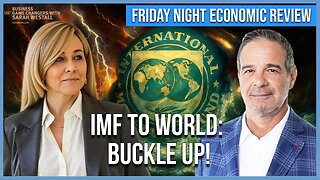 50:27
50:27
Sarah Westall
6 hours agoBig Banks Caught Rigging Market, IMF tells World to “Buckle Up” w/ Andy Schectman
25.3K9 -
 13:54
13:54
Degenerate Jay
13 hours ago $0.91 earned5 Best Superhero Movies To Watch On Halloween
11.1K4 -
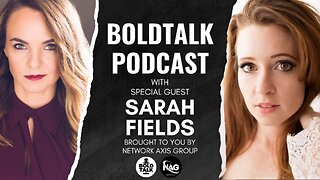 59:03
59:03
NAG Podcast
6 hours agoSarah Fields: BOLDTALK W/Angela Belcamino
17.7K6 -
 1:21:41
1:21:41
Glenn Greenwald
9 hours agoGlenn Takes Your Questions: On the Argentina Bailout, Money in Politics, and More | SYSTEM UPDATE #541
76.8K38 -
 3:10:08
3:10:08
Barry Cunningham
6 hours agoPRESIDENT TRUMP TO USE NUCLEAR OPTION? FOOD STAMPS END! | SHUTDOWN DAY 31
49.4K33 -
 1:06:56
1:06:56
BonginoReport
14 hours agoThe Battle Between Good & Evil w/ Demonologist Rick Hansen - Hayley Caronia (Ep.168)
97.9K37 -
 1:12:57
1:12:57
Kim Iversen
8 hours agoBill Gates Suddenly Says “Don’t Worry About Climate Change”?
88.3K62
